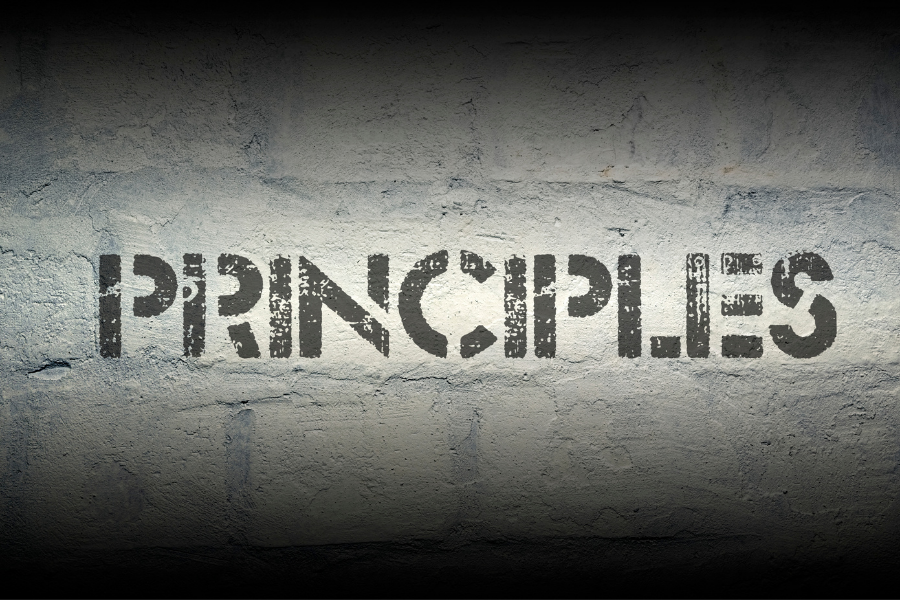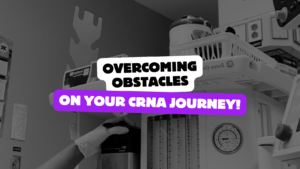Last week, I wrote the first blog article of a 4- part series on “How to Learn Anything: (Even When You Think You Can’t)”.
The first blog post touched on the importance of addressing your issues to better yourself. This post is about how to identify your core principles on your path to creating a system to learn anything. To me, this is critical to your success as a future CRNA and in your life in general.
As I began to research how I could learn best and create a personalized study system, I quickly realized a huge component of my problem was my limited thinking and lack of confidence in myself. This is when I defined my core principles that I currently use and live by to this day.
First, what are core principles?
Core principles or values are defined as the unwavering guiding principles that determine your decisions, actions, and help you pursue change. The great thing about defining your core principles is it forces you to address your limiting beliefs simultaneously.

My core principles
First, everything that everyone knows was learned either from being taught or witnessed. Therefore, I can do learn anything as well.
- So, if you want to learn something, you can do it too. Our brain is wired to grow and change, even when you are old. Research shows that the brain is a muscle and the more we use it the more it grows. There are neural connections that are formed at all times but more so when we make mistakes rather than being right all the time.
- This is know as neuroplasticity. Isn’t that amazing? There is actually some good from making mistakes. Which is why you often hear you learn more from being wrong than being right. So our intelligence isn’t fixed and we need to embrace our struggles and failures. This is also known as having a growth mindset.
Second, every excuse I had for not doing well in CRNA school was valid and true. But that was not going to get me to graduation.
- In my case I became fixated on the output and not the input. So I spent more time worrying about the outcome of the exam rather than focusing on how I would study for the exam.
- And boy did I have a lot of them of excuses. I moved 1000 miles away to attend CRNA school. I was an older student in my program. I also dealt with with unfair adversities in my CRNA program. And I have no idea how to learn this material because in the past I could just cram and pass the test the next day. Yes. Yes. Yes. All valid excuses. BUT NOW WHAT!
Third, the end result will be worth the sacrifice. I just have to keep making progress.
- This is the difference between unsuccessful people and successful people. Unsuccessful people think about what they have to give up or sacrifice to get where they are going while successful people sacrifice now for the reward later.
How to define your core principles:
Explore. Grab a pen or paper or just make notes on your device or computer. Think back to a peak moment in your life when all things were aligned.
For example, a peak moment for me was on research day where I had just finished my senior capstone project. The topic was “An Enhanced Recovery After Surgery Protocol for Former Substance Abuse Patients” in which I told the story of Max Baker who passed away from an opioid overdose shortly after surgery.
My presentation was powerful and there was not a dry eye in the room. As I made my way to my seat, the Assistant Director came over and whispered something in my ear I will never forget. She said “You started off slow, but you are here now. You will be an excellent CRNA”.
Now extract from your peak moments. Think about what values or core principles you can take from that moment. What was so important or special about it? From the moment I described above, I extracted that my core principles are:
- I’m not less than anyone else. Therefore, I can learn anything just like everyone else.
- Excuses will get me nowhere. I must put in the work.
- I will sacrifice now for the reward that is coming later.
Elaborate on them. Write what your core principles mean to you because different words mean different things to different people. It is important your core principles are meaningful and helpful to YOU. Remember this is what will allow you to succeed on your CRNA journey and in life.
Why are your principles important?
There are so many reasons why your core principles are important. It shows you will stand for something. And when you know your core principles, it allows you to have a clear vision and goal for yourself and your future.
Your core principles also help shape who you are and how you think. It also influences your overall behavior. It gives us purpose, commitment and a desire to change. It inspired me to get up and take action every morning. And the best part is it increases your confidence.
Now you understand the importance of core principles and what YOUR core principles are. So, in the next post I’ll give you all the details of my powerful study system.
P.S. If you didn’t get a chance to explore the importance of addressing your issues last week you can check out the first blog post of this series. Also get your FREE guide, Critical Care Nurses: 5 Hacks to Get Accepted to CRNA School.







